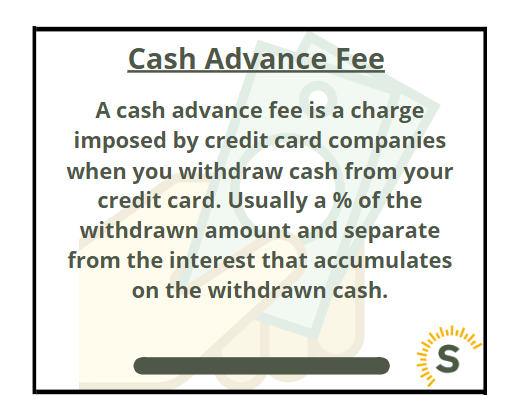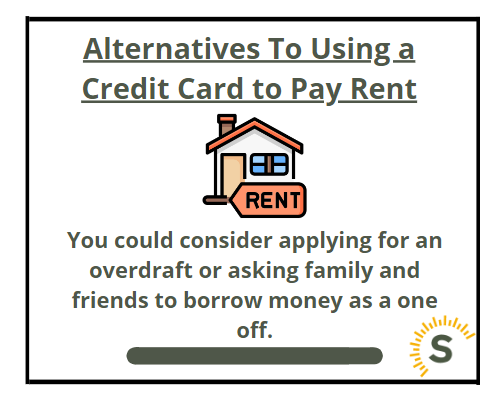
We all have unexpected expenses that we have to pay for. Sometimes they catch you off guard and out of pocket for your rent.
If you're now looking for a way to cover it you may be left wondering, Can You Pay Rent With A Credit Card?
Although it's not ideal, there may be a possibility that you can, but it depends on a few factors. In this insight, we cover whether you can pay rent with a credit card, alongside the costs and what to be aware of.
Yes, you can pay Rent with a credit card. However, this will only be the case if your landlord is a large housing association that accepts card payments. The smaller landlords don't tend to be able to process card and only accept bank transfer. Talk to your landlord to find out.
Even if your landlord does not accept credit card payments, you might still be able to use a third-party service that enables rent payment with a credit card, sometimes without additional fees.
Yes, you can advance cash on your credit card by withdrawing money from an ATM. However, the fees to do this are high. It is normally the case that you immediately pay a 3% fee and interest accrues straight away.
If you do go down the route of processing a cash advance, it can often be a sign of distress and can have an impact on your credit report. If you are due to apply for a mortgage, it would be a good idea to avoid cash advances until you complete your application.
Rather than arrange a cash advance on your credit card, you could try to pay for your other bills with your credit card and keep the cash back. For example, council tax, energy bills and water bills can all be paid for by credit card.

Paying rent with a credit card won't necessarily harm your credit score if you can pay off the rent charged on time every month. In fact, it could improve your score just like regular purchases and on-time payments would. However, serious caveats exist.
Rent is often the most significant monthly expenditure for many people. Putting such a large monthly charge on your credit card is inherently risky for several reasons, mainly if you can't afford the rent and are simply "kicking it down the road" as an effort to make rent on time.
Even if you do pay your bill on time, a high credit utilisation potentially created when paying rent with a card may hurt your credit score. If you don't pay your bill in full, any unpaid balance can quickly spiral into debt via accrued interest and ever-increasing balances. Make sure you have a plan before you commit to using your credit card for rent.
Credit cards might seem like a handy option for paying rent in a challenging situation, but they should be viewed as a last resort unless you have a surefire way to earn rewards in excess of any processing fees.
If you're running out of options, consider asking friends or family to borrow money or take out a low-interest personal loan before using a credit card. Besides a lower reward potential, regularly putting large rent payments on a credit card can max out the card quickly. The card won't be available for other purchases, and your credit utilisation (the second most important factor affecting credit scores) can increase, resulting in a lower credit score.
Instead of using your credit card, you could consider applying for an overdraft. Some bank accounts have £0 fee overdraft facilities available that can help you with short-term cash flow relief.
An overdraft occurs when you withdraw or spend more money from your bank account than you have available, resulting in a negative balance. It's essentially a short-term loan provided by the bank to cover the deficit.

If you're struggling to pay rent, there are several options to consider to help alleviate financial difficulties:
You can pay rent with a credit card if your landlord allows it, but that doesn't mean you should. If you're struggling to pay rent, consider other options, seeking aid from the government or charities, relocation, or borrowing money from friends and family.

Stuart is an expert in Property, Money, Banking & Finance, having worked in retail and investment banking for 10+ years before founding Sunny Avenue. Stuart has spent his career studying finance. He holds qualifications in financial studies, mortgage advice & practice, banking operations, dealing & financial markets, derivatives, securities & investments.





Our website offers information about financial products such as investing, savings, equity release, mortgages, and insurance. None of the information on Sunny Avenue constitutes personal advice. Sunny Avenue does not offer any of these services directly and we only act as a directory service to connect you to the experts. If you require further information to proceed you will need to request advice, for example from the financial advisers listed. If you decide to invest, read the important investment notes provided first, decide how to proceed on your own basis, and remember that investments can go up and down in value, so you could get back less than you put in.
Think carefully before securing debts against your home. A mortgage is a loan secured on your home, which you could lose if you do not keep up your mortgage payments. Check that any mortgage will meet your needs if you want to move or sell your home or you want your family to inherit it. If you are in any doubt, seek independent advice.